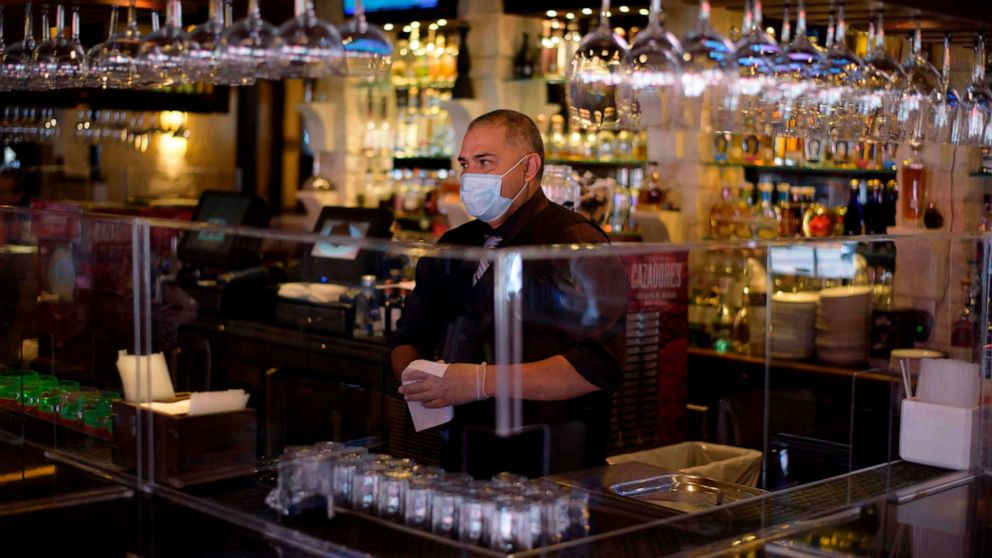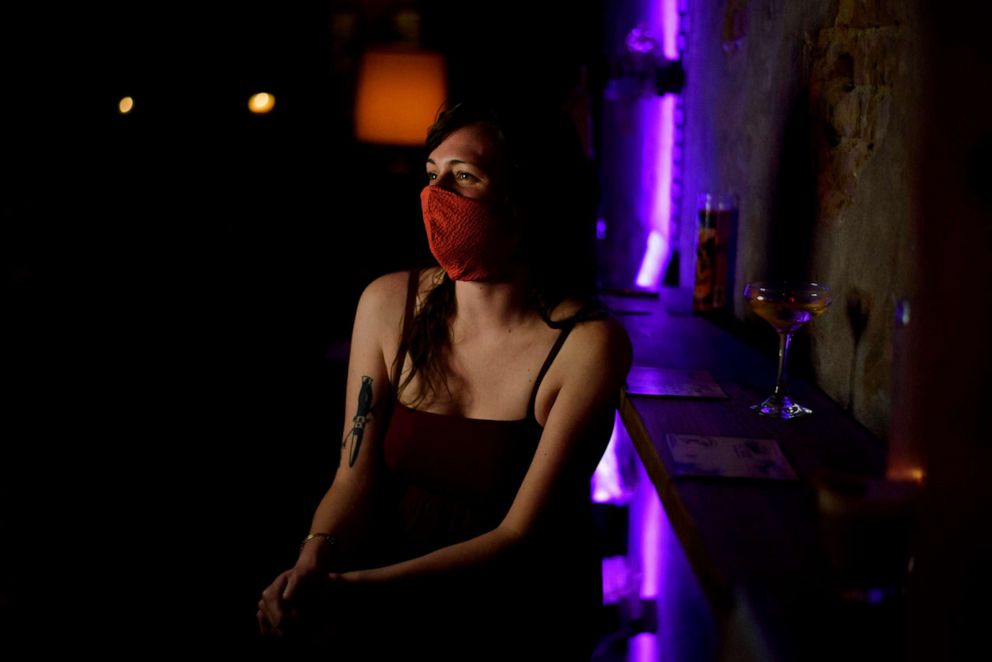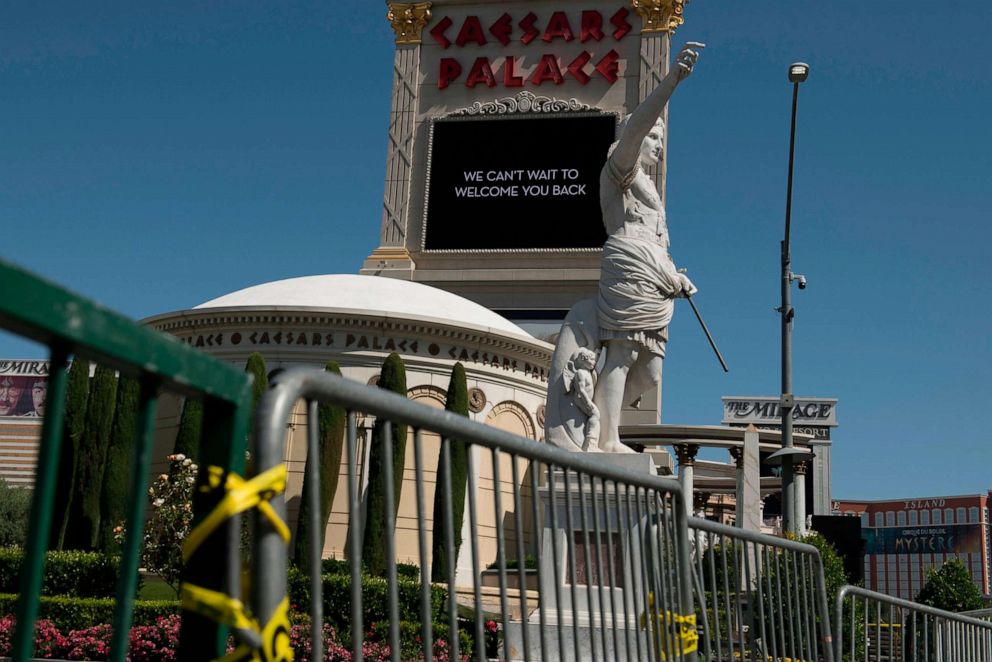Over 7 million hospitality workers were laid off in April.
By Clara McMichael ABC News
On a weekend in mid-March, Marissa Molnar was bartending at Hog Fathers BBQ in Monongahela, Pennsylvania, a small town 40 minutes outside of Pittsburgh. That night, the mood in the bar was dampened by worries of coronavirus creeping into communities across the country and fears of a national shutdown. The bar’s patrons, many of them health care workers from a nearby hospital, told Molnar how crazy their jobs had been lately. She described the mood as panicky. She closed down the bar before midnight and went home to her 1-year-old daughter.
The next day, she got laid off.
Nightlife, which consists of clubs, bars and late-night restaurants, is an industry where businesses are often poorly financed and workers are especially vulnerable. In April alone, according to the Department of Labor, 7.7 million people working in the leisure and hospitality sector lost their jobs. As the season moves into summer and states start to reopen, those who support and are supported by nightlife will be forced to confront fissures in the industry that existed long before the pandemic.

Molnar recently reentered the workforce after a pregnancy so difficult she was unable to work. During her pregnancy, she went on unemployment. When that ran out, she qualified for welfare and was on government assistance for about three months. She said she never got a stimulus check due to a complication with child support.
Tune into ABC at 1 p.m. ET and ABC News Live at 4 p.m. ET every weekday for special coverage of the novel coronavirus with the full ABC News team, including the latest news, context and analysis.
She doesn’t qualify for unemployment now because she didn’t work during the right quarter. She’s put her bills in backpay. She tried to work again at the bar, which was accepting takeout orders, but there were so many workers willing to come in they were placed on a rotation. Molnar said she only ended up working a day or two. As much as she would have loved to work full time, she said, she couldn’t because her daughter’s too young and childcare is too expensive.
«It’s rough because I have bills that I need to pay,» she said. «But at the same time, there’s no work now.»
She worries that once things open back up, there will be another economic crash after people spend their stimulus checks and unemployment money. Bartenders and servers rely heavily on tips, and Molnar fears that even when people do go out for food and drinks again they may have less for gratuities.
Andreina Seijas is a teaching fellow and doctoral candidate at the Harvard Graduate School of Design who’s researched urban nightlife for over a decade.
According to Seijas, nighttime workers, in addition to relying heavily on tips, also are vulnerable because of unfair guaranteed compensation and limited access to affordable transportation at odd hours. Seijas has heard of musicians playing in restaurants who get paid with dinner or workers using scooters to get home at 3 a.m. because they can’t afford to use ride-share apps. The pandemic has made their situations worse.
«Once bars, restaurants and clubs reopen, these workers will be at the front lines,» Seijas said. «They will be the ones whose lives will be in danger.»
In some cases, nightlife workers have taken jobs, for now, as essential workers.
Sean Anthony is an Atlanta-based DJ. At first, he heard of venues on the West Coast that were starting to cancel events. Then, a booking that Anthony had in Boston put him on standby. As COVID-19 spread, his gigs were canceled entirely, and he was told that hopefully they’d be rescheduled for October. His last event was March 14. Meanwhile, he’s picked up a part-time job at IKEA.
Many in the profession are trying to reinvent themselves and their brands. Innovators have been throwing parties online where guests can donate to the hosts, bars are offering cocktails to-go and some performers have been throwing concerts on balconies, to maintain social distance. But these stopgaps simply aren’t generating enough revenue.

As summer begins, many businesses will struggle.
Norman Houston works as a club promoter and wedding planner from Houston. He said that in late February and early March, many of those in the city’s nightlife scene began to encourage social distancing. Fewer people went out to the clubs. He arrived early to wipe down surfaces and made sure patrons were offered hand sanitizer at the door.
Houston said businesses have already missed out on revenue from big events, like Pride. He worries about other events further into the year, like Juneteenth and Fourth of July weekend.
«It’s a lot of people coming in from all over and people traveling from all over the U.S. for these weekends,» Houston said. «They pack out hotels and everything like that. So it’s a kind of ripple effect when this happened.»
Julio Zambrano, a venue owner from Miami, describes himself as a «nightlife entrepreneur.» He has worked in the industry for 25 years and now runs a podcast where he offers advice to up-and-comers. He said the pandemic took businesses by surprise.
«Some people [were]thinking it may be the next 15 days … two weeks, or so,» Zambrano said. «Not thinking it was going to be this long.»

Relief is hard to find, especially from the federal government. In April, the National Independent Venue Association, consisting of more than 1,600 club owners, petitioned Congress for financial aid. Last week, in a rare bipartisan effort, Sen. John Cornyn, R-Texas, and Sen. Tom Carper, D-Del., wrote a letter to Senate Majority Leader Mitch McConnell and Senate Minority Leader Chuck Schumer, asking that coronavirus relief legislation include independent live music venues.
Even as restrictions loosen and states phase out shelter-in-place orders, nightlife businesses will be among the last to reopen. Many states will enforce strict capacity limits and social distancing for venues, which will bring a host of new difficulties.
«Most venues operate on 125% capacity to 200% capacity to make it,» Zambrano said. «So I don’t know what 25% capacity is going to look like in the books.»
Industry leaders have suggested solutions to some of these problems, ideas such as spreading out nightlife hubs instead of having them clustered in high-density areas, loosening licensing regulations, extending closing times and using outdoor space to accommodate more people while keeping social distance.
«The truth is that we don’t need to be packed like sardines into a bar or a restaurant to experience quality nightlife,» Seijas wrote in a paper about how the industry can be saved.
Nightlife has always been resilient, and while the pandemic has slowed the business, Seijas doesn’t think it will be down forever.
«There are things that will never change,» Seijas said. «I don’t think we, as human beings, can live without the social. … It’s part of who we are.»
Source: ABC News (sp)




